
If you think we only need to be concerned solely with pesticide exposure from conventionally sprayed fruits and vegetables, then think again.
When this article came out reporting on a study that “New Yorkers are exposed to more pesticides than rural residents“, I almost brushed past it.
Then a thought struck me. Why would this scenario only be confined to the borders of New York?
Wouldn’t every major city be faced with the very same issue, just varying on scale?
Consider this. Say you live in an apartment block in the city. The body corporate is responsible for routine pest control sprays. So by default, you generally have no control over this. From home, you travel to work. The office building you work in is also routinely sprayed. More exposure. You may then ride to and from work using public transport that go through the same processes. Then not to mention the various public and private spaces you spend your time in, like libraries, universities, schools, restaurants… your exposure to pesticides is huge and the potential to experience the serious health complications as a result, significantly magnified.
You certainly don’t need to be living on a farm spraying conventional pesticides on crops to risk exposure.
On a commercial scale, pesticide spraying is rampant. It’s a given that most, if not all commercial buildings, are required to do routine pesticide sprays as part of contractual maintenance.
In some residential blocks, it’s standard process for sprays to be conducted monthly!
I live in an apartment block where it’s an annual process. It’s in my contract. I signed it, I have to accept it. Can I breathe easy knowing that at least they’ve enlisted a contractor that uses “Organic Pesticide”. Probably not. Sure, there are commercial organic pesticides available on the market that may be less problematic for my health and the environment, however, most ‘organic sprays’ haven’t even been fully studied as to whether they are completely safe or not.
Whilst no amount of pesticide exposure can be deemed safe, it’s more of a concern about the constant exposure and the long term affects that should cause us to cringe. The American Medical Association state that “particular uncertainty exists regarding the long-term effects of low-dose pesticide exposures.”
After all, commercially manufactured pesticides were only invented in 1939 and it’s only in our current generation that they’ve been so widely used that the long term consequences are largely still laying dormant, if not already, affecting us much to our obliviousness.
This raises the questions though,
Are Organic Pesticides any better?
Not necessarily.
First though, we must ask, what constitutes an organic pesticide?
Simply labeling something as ‘Organic’ does not determine whether a product is good for you or not. It’s a matter of origin of the ingredients. They are naturally derived as opposed to being synthetically created like conventional pesticides.
There are plenty of highly poisonous fungi and plants that are organic and natural but which generate toxins and chemicals to ward off predators. Even some foods we eat as part of our daily diets need to be prepared in such a way to mitigate these effects. The point I’m make here is, just because it’s natural, that doesn’t mean it’s safe to consume. As studies have found, these natural and organic chemicals can be just as harmful to human health than synthetic pesticides.
What are the Health Concerns of Pesticides?
Pesticide exposure can cause a host of problems for our health. This article from Sustainable Baby Steps even links studies that have found pesticides to induce carcinogenic reactions in the human body; on top of the endocrine and hormonal disruptions, infertility, neurological imbalances and physiological effects.
Commonly reported symptoms of over-exposure to pesticides include:
burning, stinging, or itchy eyes, nose, throat and skin
nausea
vomiting
diarrhea
wheezing
coughing
headache
A 60 day study was conducted by the China Institute of Sciences to determine the effects of exposing two types of pyrethroid insecticides to lab rats. The results suggested “disturbances to energy metabolism, including an increased rate of anaerobic glycolysis, enhanced fatty acid β-oxidation, ketogenesis and kidney lesions.”
YUCK!
Children are particularly vulnerable as they have less developed immune systems to that of adults. So think twice before grabbing that can of bug spray when you have a child around.
A growing body of evidence even suggests growing cases of neurological deficits associated with exposure to Organophosphate pesticides in children. If even farm children are being hospitalised with medical conditions such as apnea, cyanosis, somnolence, hypotonia, tachycardia, and miosis due to pesticide exposure, what makes you think the levels we are exposed to in the city are not comparable and just as dangerous?
If agricultural spray drift in rural environments can cause such potential health problems as detailed here, we mustn’t remain oblivious to the potential hazards of pesticide use in our cities and think that we can remain immune.
Environmental Concerns
Surface sprays, quite literally, can dissolve into thin-air. I don’t mean in the magical disappearing sense though. We either breathe it in, or it gets absorbed into the atmosphere to mix in with the other thousands of toxins floating around. A gust of wind in your hair may not feel so lovely and comforting after all with this thought in mind.
That which remains on the surface may simply wash-off which transfers these chemical into our waterways.
“The use of pesticides by homeowners or pest control operators in urban settings is common, yet contributions of wash-off from these materials are not easily understood.” (Source)
Unless your slobbering and innocent baby doesn’t lick it off first. Have I got your attention yet? Yes, this is a real concern.
Neither is preferred really.
Mores studies are proving that even by mitigating the usage of pyrethroid pesticides by switching from suspension concentrate-categorized products (intended for dilution with water) to emulsifiable concentrate-categorized products (liquid separable as seen when oil and water are combined but seperate), the run-off into waterways from urban spraying is still high in concentration of these chemicals which is hazardous for aquatic life.
So what can you do?
Your best bet is to avoid exposure all together. This can occur through inhalation, skin or eye exposure or ingestion. Absorption through the skin is the most common form of exposure so it’s important to wear non-penetrable clothing if you are dealing with sprays.
Mother Nature News details some more natural pesticide alternatives that may give you some encouragement to research further into the matter.
If you are like me and live in an apartment block, check your lease or rental agreement as it’s very likely there’s a clause stating that its mandatory for pest inspection and control be executed in the building. By refusing to accept pest control access to your apartment, you may risk eviction. We wouldn’t want to see you living on the streets now, would we?
It’s most certainly worth a conversation with your body corporate around what alternatives are available, such as preventative measures, and at the very least, exploring less toxic forms of pest management.
Whilst we may not be able to control the amount of pesticide spraying that goes on outside of our home, you can most certainly controls what goes on inside your own home!
The best way to avoid exposure though, is of course, PREVENTION.
Here are 5 quick and dirty clean tips to help prevent pests and rodents around the home.
1. Keep it clean
Make sure trash is frequently emptied and no open food is left laying around where it may attract unwanted visitors. Keep your food well sealed in the pantry, floors well swept and hidden spaces, like under the fridge, free from rotting food crumbs. Even the smallest of sticky spots may be enough to attract an army of ants your way.
2. Outdoor maintenance
In the yard, keep your compost covered and your garbage bin well sealed. Any build up of yard scraps, wood piles, building materials, etc, are potential homes for rodents and creepy crawlies. Mosquitoes lay their larvae in open pools of water, so keep potential breeding grounds, such as outdoor containers and empty gardening pots, stored away or turned upside down.
3. Seal the house and all those nooks and crannies
Invest in screen covers for your doors to avoid suffocating yourself in the house so you can keep your doors and windows open but keep the bugs outside where they belong. Keep a tab on any potential cracks in the building fixtures. Plug your kitchen and bathroom drains as these act as vessels of transportation for pests. You don’t want to have a “Psycho” moment in the shower with a cockroach.
4. Use the natural ecosystem to your advantage
Strong aromatic plants not only smell great but a lot act as natural bug repellents! Marigold and Lavender are some examples. Attract wildlife that eat the pests for you. Daddy-long-leg spiders, lady beetles, lizards, birds and geckos are all harmless creatures and largely do the hard work for you!
5. Set the bait, and trap!
Get creative and put in place some bug traps, like sticky tape and molasses/honey containers. You can even buy traps that cage the rodent as opposed to killing them if that’s your preference. Then you can leave them for the birds to do their job in the wild! Not to mention, capturing bugs makes excellent feed for your chickens too!
My question to you is, how do you deal with pesticide use in the home and office?
![]()
© 2013 The Urban Ecolife. You’re welcome to pin my posts but please refrain from reposting full recipes or posts to any other website. That’s just not cool bro.
STANDARD FTC DISCLOSURE: In order for me to support my blogging activities, I may receive a few dollars here and there or other types of remuneration for my endorsement, recommendation, testimonial and/or link to any products or services from this blog. Please note that I only ever endorse products that are in alignment with The Urban Ecolife’s ideals and that I believe would be of value to my readers.











Thanks for the tips!